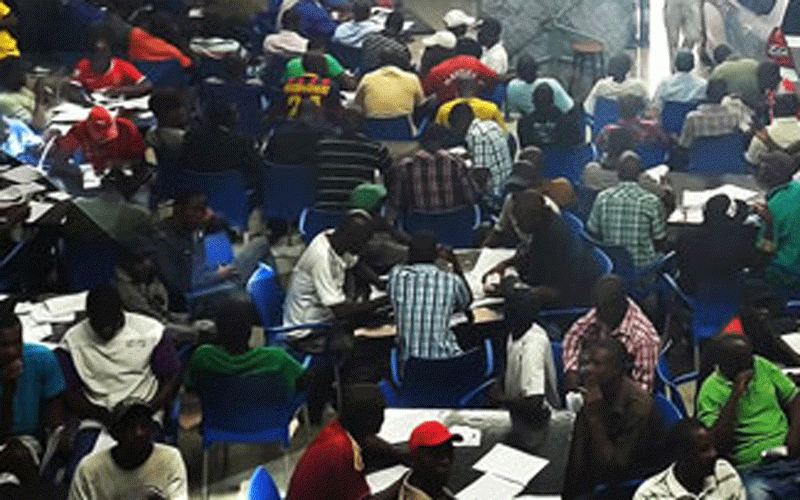
ZIMBABWE'S socio-economic landscape is witnessing an alarming surge in gambling addiction, particularly among its youth population, emerging as a crisis that parallels, if not surpasses, the notorious "mutoriro" drug epidemic.
In the heart of Harare, Mutare, Bulawayo and other urban centres, these betting establishments have become the new temples of hope for a generation crushed under the weight of economic collapse and widespread unemployment.
The psychological warfare unleashed by gambling addiction manifests in particularly sinister ways among Zimbabwe's youth population.
Unlike the visible physical deterioration associated with drug abuse, gambling addiction creeps silently through communities, destroying lives while maintaining a façade of normalcy.
The recent phenomenon of "chindege" (aviator) betting has captured the imagination of thousands, offering the illusion of quick riches in a country where legitimate economic opportunities have become as rare as rainfall in the Kalahari.
Young men and women, many with university degrees and untapped potential, spend countless hours glued to screens, watching a virtual aircraft ascend and crash, their hopes rising and falling with each digital trajectory.
The social fabric of Zimbabwean society, traditionally held together by strong family bonds and community values, is rapidly unravelling under the strain of this gambling epidemic.
Marriages crumble as household incomes disappear into the bottomless pit of betting addiction.
- Why are some nations neutral on the Russia-Ukraine war?
- A look at disunity on war in Ukraine
- Building narratives: Kwekweza wins global speech contest
- Out & about: Tyler Page’s WAGMI sets her up
Keep Reading
Children go hungry while their fathers chase the next big win, and mothers, traditionally the anchors of family stability, are increasingly succumbing to the allure of gambling themselves.
I recently visited a local betting shop in Harare. When I went in, the dimly lit room was packed with young men and even women, their eyes transfixed on screens displaying the popular "chindege" (aviator) game. Curiosity led me to approach one of the gamblers, asking him about the game's mechanics. His response sent chills down my spine: "If you have never played this before, do not even attempt it," he said with a knowing laugh that barely masked his pain, "this is addictive and you become a prisoner of this thing." His words carried the weight of personal experience and as I looked around the room at the dozens of young faces, many of whom should have been at work or in school, I saw not hopeful gamblers, but prisoners trapped in an invisible cage of addiction, desperately chasing losses with borrowed money and broken dreams.
The economic implications of this crisis extend far beyond individual losses. In a country already struggling with hyperinflation and massive unemployment, the gambling epidemic represents a significant drain on productive capacity. Young people, who could be driving economic recovery through entrepreneurship or skilled labour, instead spend their days and nights in betting shops, their creative energies and potential contributions to society wasted in the pursuit of illusory riches. The official unemployment rate of over 80% has created a perfect breeding ground for gambling addiction, as desperation drives people to seek miraculous financial solutions.
The psychological damage inflicted by gambling addiction manifests in various forms of mental health deterioration.
Anxiety, depression and suicidal ideation have become common among regular gamblers, particularly after significant losses.
The occasional wins, strategically designed by betting companies to keep hope alive, serve only to deepen the addiction, creating a psychological trap from which escape becomes increasingly difficult.
The mental health infrastructure in Zimbabwe, already strained by years of economic hardship, is ill-equipped to handle this growing crisis.
Religious institutions, traditionally bastions of moral guidance and community support, find themselves increasingly powerless against the tide of gambling addiction. Church leaders report declining attendance as young people choose betting shops over Sunday services.
The moral fabric of society faces unprecedented challenges as gambling normalises risk-taking behaviour and promotes the dangerous notion that wealth can be acquired without work or merit.
This fundamental shift in values threatens to reshape Zimbabwean society in ways that can take generations to reverse.
The solution to this crisis requires a comprehensive, multi-stakeholder approach that addresses both immediate symptoms and underlying causes.
Government intervention must go beyond simple regulation to include meaningful economic reforms that create genuine opportunities for youth employment and entrepreneurship.
The establishment of specialised addiction treatment centres, staffed by professionals trained in gambling addiction therapy, should be prioritised. Community-based support groups, modelled on successful addiction recovery programmes, must be established in every neighbourhood affected by this crisis.
Educational institutions must play a central role in prevention by incorporating comprehensive financial literacy programmes that expose the mathematical impossibility of long-term gambling success.
These programmes should start in primary schools and continue through tertiary education, creating a generation of Zimbabweans equipped to resist the false promises of gambling addiction.
The media must be enlisted in this fight, moving beyond sensationalist coverage of gambling wins to expose the devastating reality of addiction and its impact on communities.
The banking sector and financial institutions must also participate in this battle by developing products and services that promote saving and legitimate investment, particularly among young people.
Mobile money platforms, which have become enablers of gambling addiction, should be required to implement strict controls and limits on betting-related transactions. The technology sector should be encouraged to develop applications and platforms that promote productive economic activities rather than gambling.
The future of Zimbabwe's youth, and, indeed, the nation itself, hangs in the balance as this silent destroyer continues its relentless march through communities, leaving broken lives and shattered dreams in its wake.
- Lawrence Makamanzi is an independent researcher and analyst, passionately sharing his insights in a personal capacity. He is reachable at blmakamanzi@gmail.com or 0784318605.










